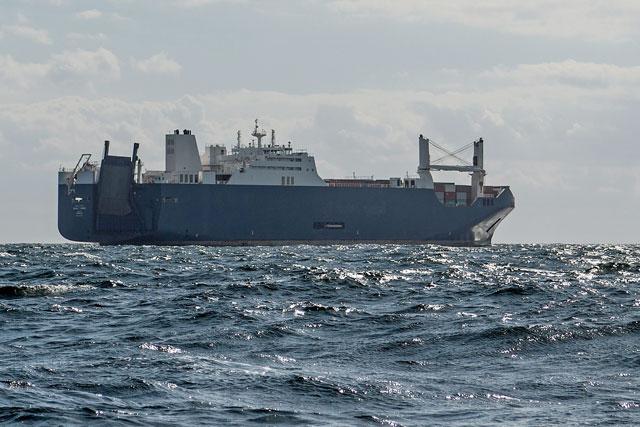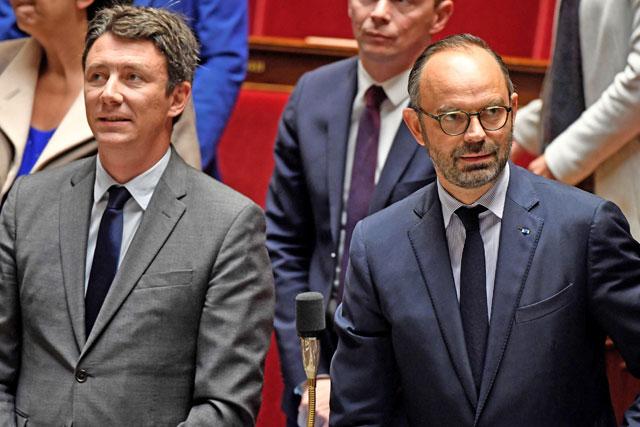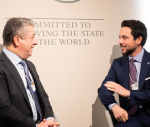You are here
Yemen war: Breaking point in EU arms sales to Gulf?
By AFP - May 11,2019 - Last updated at May 11,2019

This photo taken on Thursday off the northern port of Le Havre shows Saudi cargo ship Bahri Yanbu waiting to enter the port of Le Havre (AFP photo)
PARIS — The Saudi-led military campaign in Yemen may have increased public pressure on EU governments to freeze arms sales to the kingdom but for now, it seems unlikely to spawn radical new policy changes.
The war in Yemen pits the military coalition headed by Saudi Arabia against Iran-backed Shiite Houthi rebels in a conflict which has killed tens of thousands of people, many of them civilians and triggered what the United Nations has called the world’s worst humanitarian crisis.
The public spotlight on the kingdom’s behaviour has intensified since dissident Jamal Khashoggi was killed last year inside its consulate in Istanbul by a Saudi assassination squad, a crime Riyadh insists it had nothing to do with.
But in countries like Britain and France, arms deliveries to Saudi Arabia and its key partner the United Arab Emirates — regarded as close allies — are seen as critically important for keeping military influence and also preserving potentially thousands of jobs.
A new delivery of French arms to a Saudi ship, the Bahri Yanbu, was awaited in the French port of Le Havre. But the vessel will no longer dock there despite having anchored off the port for days, a source said on Friday.
The change of plan came after protests but it was not immediately clear what had caused it or where the vessel would head next.
‘Guarantees not enough’
“Clearly, with the war in Yemen there has been a rupture,” Aymeric Elluin of Amnesty International France said.
“There has been an awakening for a time in Germany, Belgium, Britain and Italy. In France, it’s something very new.”
Paris delivered some 1.38 billion euros ($1.5 billion) of weapons to Riyadh in 2017, making it France’s second-biggest customer in the sector after Egypt.
French President Emmanuel Macron on Thursday defended the arms sales, describing Riyadh and Abu Dhabi as allies in the fight against terror and saying Paris had received guarantees they would not be used against civilians.
But Elluin dismissed the assurances.
“It’s not enough to say ‘I have guarantees’, we need to be shown them. And at the same time, we would like to be told clearly how Saudi Arabia is fighting against terror in Yemen.”
Tony Fortin, a researcher at the Armaments Observatory NGO in France, said the current situation was the result of years of secrecy.
“What we are seeing today is that this lack of transparency is coming back to us and resulting in catastrophes like the one in Yemen,” he said.
The current positions of key EU arms suppliers are as follows:
Germany
Defying opposition from its own EU allies, Berlin was the only key power to impose an arms embargo against Saudi Arabia in the wake of the Khashoggi crisis.
In March, it announced a six-month extension of the ban to September 30.
France
French investigative news site Disclose leaked a classified military note last month detailing the use of French tanks and artillery in the Yemen war.
Defence Minister Florence Parly then confirmed the planned Le Havre shipment of arms to Saudi, provoking opposition anger by declaring there was “no proof” of casualties in Yemen caused by French weapons.
UK
Britain accounts for 23 per cent of arms imports to Saudi Arabia and last year signed a multibillion-pound preliminary order from Saudi for 48 Eurofighter Typhoon fighter jets.
It has licensed nearly £5 billion ($6.5 billion) in weapons to Saudi Arabia since the bombing of Yemen began in 2015, according to government figures analysed by advocacy group Campaign against the Arms Trade.
Spain
Spain exported 496 million euros ($557 million) worth of arms to Saudi Arabia in 2017 and the socialist government of Prime Minister Pedro Sanchez was last year criticised by its ultra-left ally Podemos for keeping in place an order of 400 laser-guided bombs to the kingdom.
Podemos has also pressured Sanchez over a 1.8 billion-euro ($2-billion) contract to build five warships for Saudi which the premier has defended.
‘Push the line’
“There is a growing worry concerning these questions and a lack of oversight” in the French parliament, said Jacques Maire, an MP for Macron’s ruling party.
“And at the end of the day, in all the countries, the executive has the last word.”
Denis Jacqmin, a researcher at the Group for Research and Information on Peace and Security (Grip) in Brussels, acknowledged that public opinion “tires quickly”, saying it was “complicated to carry out a campaign based on Yemen”.
Grip is pressing for the creation of a pan-European watchdog to regulate arms sales.
It says that a common position adopted by EU leaders in 2008 laid down “criteria”, but “every state, unfortunately, has its interpretation and can push the line of what is acceptable ever further”.
Related Articles
PARIS — France could impose sanctions on Saudi Arabia if its intelligence services establish the kingdom is behind the murder of journalist
PARIS — Yemen’s war must stop, France’s Defence Minister Florence Parly said on Tuesday, toughening Paris’ stance as photographs of starving
PARIS — French arms including tanks and laser-guided missile systems sold to Saudi Arabia and the United Arab Emirates are being used in the
















